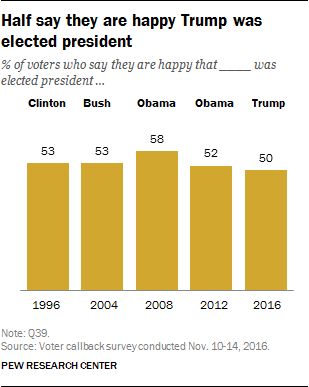
Half of voters say they are happy Donald Trump was elected president, while about as many (48%) say that they are unhappy. Reactions are similar to 2012 (when 52% said they were happy Obama was reelected), but they are less positive than after Obama’s first presidential campaign in 2008, when 58% said they were happy he was elected.
Not surprisingly, 97% of Trump voters say they are happy he won, while 93% of Clinton voters say they are unhappy. While wide majorities of voters for the losing presidential candidate are always broadly dissatisfied with the election outcome, this phenomenon was less pronounced eight years ago; in 2008, 77% of McCain supporters said they were unhappy Obama won and 13% said they were happy.
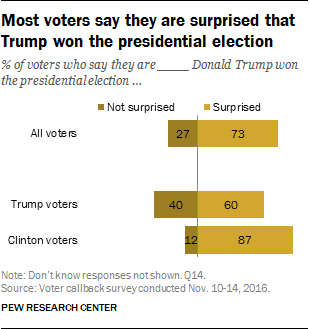
One reaction to the election outcome that most Trump and Clinton supporters share is surprise. Overall, 73% of all voters say they are surprised that Trump won the election, including 87% of Clinton voters. A somewhat smaller 60%-majority of Trump voters express surprise at the outcome, though 40% say they are not surprised he won.
Emotional reactions to Trump’s election
Voters express a mix of emotional reactions to the election of Donald Trump. On the positive side, 51% say that Trump’s election makes them feel hopeful; somewhat fewer say it makes them feel proud (36%).
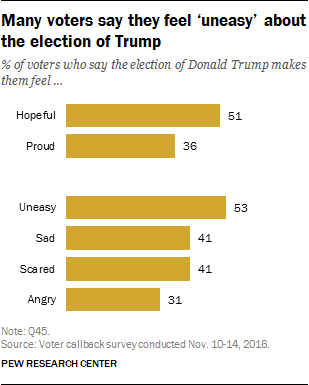
On the negative side, 53% say Trump’s election makes them feel uneasy. About four-in-ten say his election makes them feel sad (41%) or scared (41%), and 31% say the election of Trump makes them feel angry.
Eight years ago, voters’ emotional reactions to Obama’s election were somewhat more positive. In response to a slightly differently worded question that asked about how Obama made them feel – as opposed to how the election of Obama made them feel – fully 69% of voters said he made them feel hopeful, while just 35% said that he made them feel uneasy.
Nearly all Trump supporters (96%) say that his election makes them feel hopeful. A somewhat smaller – but still wide – majority of Trump supporters say that his election makes them feel proud (74%).
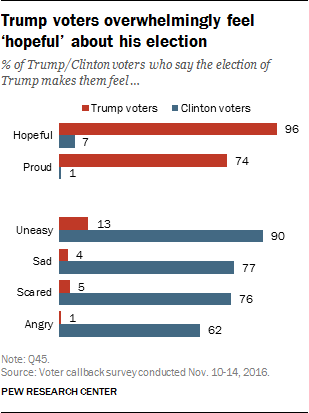
Among Clinton supporters, the most widespread reaction to Trump’s victory is unease: 90% say the election of Trump makes them feel uneasy. About three-quarters say his election makes them feel sad (77%) or scared (76%). While less widespread than other negative reactions, most Clinton supporters (62%) also say Trump’s election makes them feel angry.
Though majorities of Clinton supporters across demographic groups express unease, sadness, fear and anger about the election of Trump, Clinton voters with college degrees are more likely than those with less education to express anger and sadness. About seven-in-ten Clinton voters with a bachelor’s degree or higher (69%) say Trump’s election makes them feel angry; a narrower 56% majority of Clinton voters with less education say this. And while 70% of Clinton voters who have not graduated from college say Trump’s election makes them feel sad, fully 85% who have college degrees say that it does.
Will Trump have a successful first term?
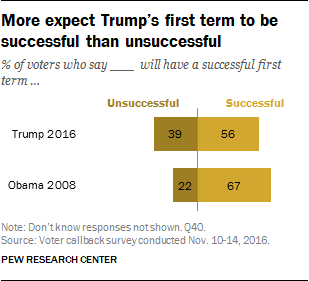
On balance, voters are optimistic about Trump’s first term: 56% say it’s more likely that Trump will have a successful first term, while 39% say it’s more likely that he’ll have an unsuccessful first term. Overall views on this question are about the same as they were four years ago, after Barack Obama’s reelection, but are less positive than in 2008. Following Obama’s victory over John McCain eight years ago, 67% of voters expected Obama would have a successful first term.
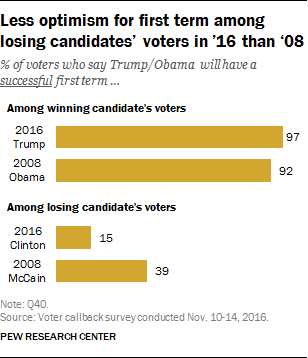
An overwhelming 97% of Trump voters expect him to have a successful first term; this is comparable to the 92% of Obama voters who said this about their candidate in 2008.
Views of Trump’s first term among Clinton voters are broadly negative and they are more negative than expectations were for Obama’s first term among John McCain’s supporters in 2008. Overall, just 15% of Clinton supporters think Trump’s first term will be successful, while 76% think it will be unsuccessful. In 2008, nearly four-in-ten McCain supporters (39%) thought Obama would have a successful first term.
Can Clinton voters give Trump a chance?
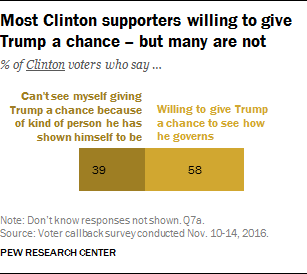
While expectations for Trump’s administration among Clinton voters are low, 58% say they’re “willing to give Trump a chance and see how he governs.” But nearly four-in-ten Clinton voters (39%) say “I can’t see myself giving Trump a chance because of the kind of person he has shown himself to be.” Clinton supporters expressed highly negative evaluations of Trump throughout the campaign. For example, in October registered voters who supported Clinton said Trump lacked respect for a wide range of groups, including women, blacks, Hispanics, immigrants and Muslims.
Clinton voters under the ages of 18-49 are somewhat less likely to say they are willing to give Trump a chance (52%) than are Clinton supporters age 50 and older (64%). There are only modest differences across other demographic groups among Clinton supporters.
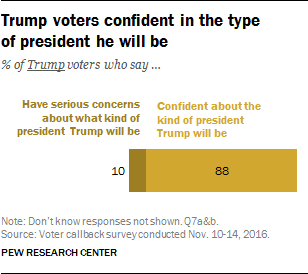
In the wake of Trump’s election, there is little sign of concern among his voters about the type of president he will be. Overall, 88% of Trump voters say they are confident about the kind of president he will be, while just 10% say they have serious concerns about the kind of president he will be.
Voters split on whether Trump will favor the needs of his supporters
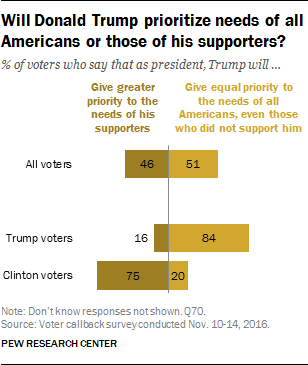
After a heated general election campaign, voters are divided over whether they think Trump will put the needs of those who supported him in the election ahead of the needs of other Americans. Overall, 51% say that Trump will give equal priority to all Americans, including those who did not support him; 46% say Trump will give greater priority to the needs of those who supported him in the election.
However, these views largely divide along lines of support: Trump voters overwhelmingly say that he will give equal priority to the needs of all Americans (84%). By contrast, 75% of Clinton voters think he will give greater priority to the needs of his supporters.
Views of how Trump will change Washington
About half of voters (48%) say they think Trump will change the way things work in Washington for the better, 25% think he will change things for the worse and 25% do not think he will change things much either way.
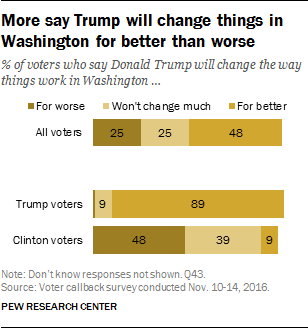
Overwhelmingly, Trump voters expect their candidate to bring positive change to Washington: 89% think he will change the way things work for the better, while just 9% don’t think he’ll change things much either way and 1% say he’ll change things for the worse.
Clinton voters are split in their views: 48% think Trump will change the way things work in Washington for the worse, while 39% don’t expect him to change things much either way and just 9% think he will change Washington for the better.
Many voters not clear on Trump’s goals and vision for country
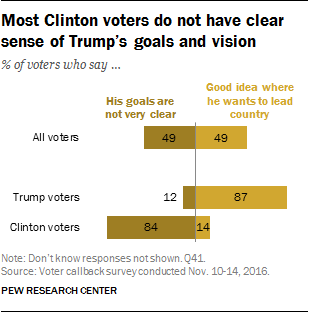
While most voters say that Trump will change Washington – either for the better or for the worse – many say they do not have a good idea of Trump’s vision for the country. As many voters say they have a good idea of where Trump wants to lead the country (49%) as say his goals are not very clear (49%).
By 87%-12%, Trump voters say they have a good idea of where Trump wants to lead the country. Opinion is the reverse among Clinton voters. Fully 84% of her supporters say Trump’s goals are not very clear, while just 14% say they have a good idea of where he wants to take the country.
Health care tops list of priorities voters suggest Trump tackle first
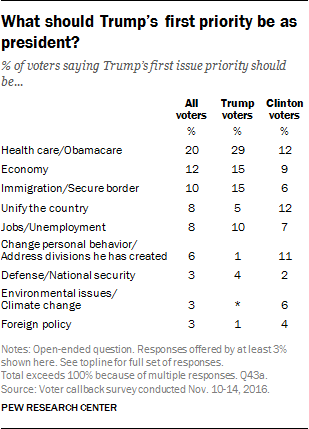
Voters offer a mix of ideas for what Trump’s first priority should be as president. In an open-ended question, 20% of voters suggest health care as Trump’s first priority – the most of any other issue area voters named. Roughly one-in-ten name the economy (12%), immigration (10%), unifying the country (8%) and jobs and unemployment (8%) as the top priority issues Trump should address as president.
Another 6% of voters think Trump’s first priority should be to change his personal behavior and address divisions stoked during his campaign.
Fewer mention environmental issues and climate change, as well as foreign policy, as Trump’s first priority as president (3% each).
Nearly three-in-ten (29%) Trump voters name health care as Trump’s first priority as president, compared with fewer Clinton voters (12%) who say the same (note that while most voters who mentioned health care did not mention what they’d like to see done, among those who did mention what they’d like to see done, Trump voters were more likely to mention repealing the Affordable Care Act, while Clinton voters were more likely to mention maintaining it, or fixing it). Trump voters also were slightly more likely than Clinton voters to name the economy (15% vs. 9%) and immigration (15% vs. 6%). Trump and Clinton voters were about equally likely to say that jobs (10% vs. 7%) should be the main priority of the president-elect.
Among Clinton voters, about a quarter (23%) offer as their top priority for Trump suggestions about healing divisions: 12% say that Trump should prioritize unifying the country, while 11% want to see him change his personal behavior and address divisions he created during his campaign.
Mixed views of confidence in Trump on major issues
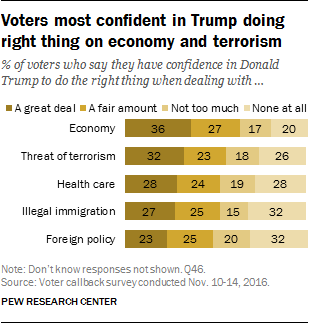
When asked how much confidence they have in Trump to “do the right thing” dealing with five major issues, Trump performs best when it comes to dealing with the economy: 62% of voters have a great deal or a fair amount of confidence in him in this area, including 36% who express a great deal of confidence in Trump, while 37% say they have little or no confidence in him. And 56% have at least a fair amount of confidence in Trump to do the right thing regarding the threat of terrorism, while 44% say they have little or no confidence in him on this issue.
In three other areas: dealing with health care, illegal immigration and foreign policy, voters’ views are more divided, with roughly half of voters expressing little or no confidence in Trump on these issues and about half expressing at least a fair amount of confidence.
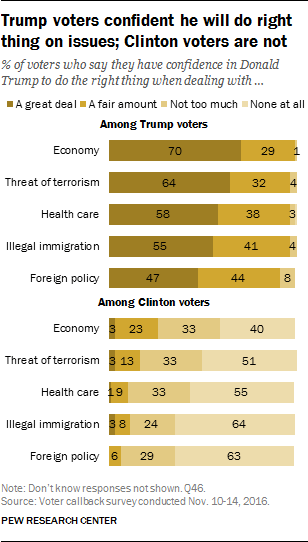
At least nine-in-ten Trump voters say they have at least a fair amount of confidence in him on each of these five issues. However, the share expressing a great deal of confidence in Trump varies by issue. Seven-in-ten of his voters have a great deal of confidence that he will do the right thing on the economy (70%), and nearly as many (64%) say this about the threat of terrorism. Yet fewer express a great deal of confidence that he will do the right thing when it comes to health care (58%) or illegal immigration (55%), and only about half (47%) of Trump voters express a great deal of confidence in him on foreign policy.
Conversely, most Clinton voters say they have not too much or no confidence at all that Trump will do the right thing on all of these issues. On four of five issues, over 80% of Clinton supporters say they have not too much or no confidence. Nearly two-thirds of Clinton supporters say they have no confidence at all in Trump to do the right thing when it comes to illegal immigration (64%) or foreign policy (63%). However, just 40% say they have no confidence in Trump when it comes to dealing with the economy.
Despite the vast gulf in confidence between Clinton and Trump voters, both sides tend to give Trump relatively better – or worse – ratings on the same issues. For example, both give Trump his best marks on the economy – where the largest share (27%) of Clinton supporters say they have at least a fair amount of confidence and 99% of Trump supporters say the same. Similarly, confidence in Trump is weaker on foreign policy among both his supporters and Clinton’s.
Few voters expect Trump’s election to lead to improved race relations
Voters are skeptical that Trump’s election as president will lead to better race relations in the United States: Just a quarter (25%) think this is the case. By contrast, 46% of voters say race relations will get worse after Trump’s election, and 26% say his election will make no difference. Voters were much more optimistic that Obama would have a positive impact on race relations in the days following his 2008 election: 52% said his election would lead to improving race relations, while just 9% said they would worsen (36% expected little change).
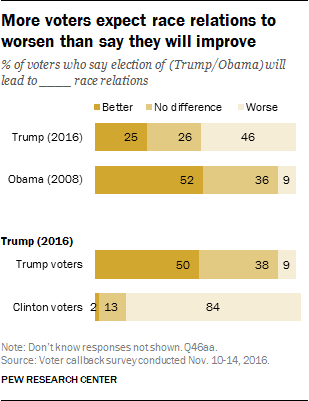
There are stark differences by vote choice in opinion on progress for race relations after Trump’s election. Half of Trump voters (50%) expect race relations to get better, and 38% think his election will make no difference; just 9% think race relations will get worse.
On the other hand, an overwhelming majority of Clinton voters (84%) think Trump’s election will lead to worse race relations in the country. Few Clinton voters think his election will make no difference (13%) or lead to better race relations (2%). In 2008, Obama voters were more optimistic than McCain’s that race relations would improve (69% vs. 34%); still, just 17% of McCain’s voters expected relations would worsen (a 45% plurality said Obama’s election would not make a difference).




